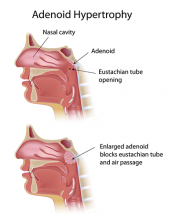Nasal Obstruction

What are the common causes of a blocked nose in children?
The most common causes of nasal obstruction in children are allergies and an enlarged adenoid. A blocked nose may also be accompanied by a runny nose. Allergies in children are quite common and they cause inflammation within the nose. This results in swelling of the nasal tissues and limits the passage of air through the nose. Treatment is aimed at increasing the 'space' inside the nose, see below.
What are the adenoids?

The adenoids are lymphoid ('immune') tissue that resides at the very back of the nose (see picture). The lymphoid tissues here assists the developing immune system in the first 1-2 years of life. Viruses and bacteria that enter the body through the mouth or nose come into contact with the tonsils and adenoids and it is here that the body develops antibodies that make up the body’s immune response to these organisms. After this time, these organs are not essential for life or immunity and can be removed if they are causing problems.
How do you treat nasal obstruction in children?
p>Firstly you need to identify the cause of the blocked nose. After that the treatments are either medical, particularly if there's allergies, or surgical. For allergies, the most common treatments are nasal sprays which reduce the inflammation in the nose. Surgery for allergies is only occasionally required in children but involves reducing the size of the turbinates (bones that hang in from either side of the nose). This can be either cautery or a more involved procedure. Click here to read more about turbinate surgery.
Removal of the adenoid is called adenoidectomy. There are a variety of reasons why this operation may be performed and a blocked nose is one of those. Click here to read more about adenoidectomy.